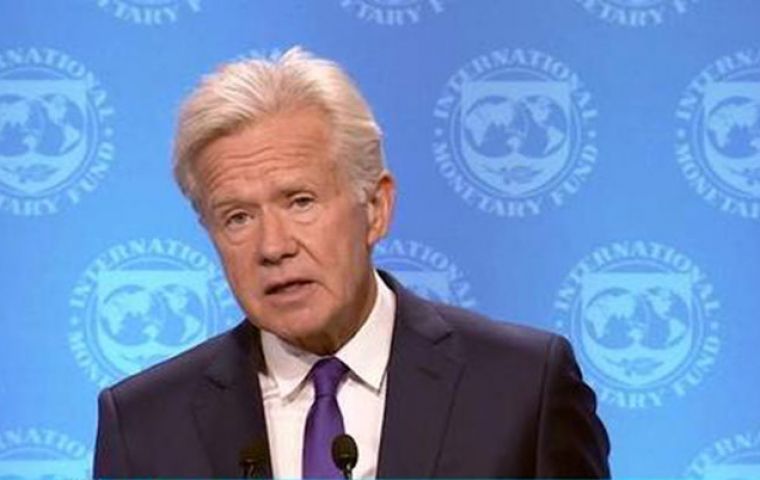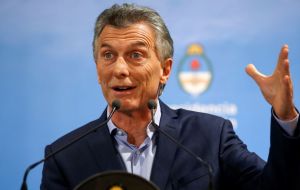MercoPress. South Atlantic News Agency
IMF confirms support for Macri, but also with greater focus on social protection
 Rice stressed that the current situation, marked by “renewed financial market volatility” is very different than the last time Argentina went to the IMF for aid.
Rice stressed that the current situation, marked by “renewed financial market volatility” is very different than the last time Argentina went to the IMF for aid.  Macri on Wednesday said the currency crisis had passed. “The central problem is the fiscal deficit,” Macri added. “We have to reduce it”
Macri on Wednesday said the currency crisis had passed. “The central problem is the fiscal deficit,” Macri added. “We have to reduce it”  “Our ultimate goal is to help support the authorities in their efforts to strengthen the economy and to protect the living standards of Argentine people” said Rice
“Our ultimate goal is to help support the authorities in their efforts to strengthen the economy and to protect the living standards of Argentine people” said Rice The International Monetary Fund will move quickly to agree on a loan program to support Argentina but there are no details yet on what it will entail, a fund spokesman said on Thursday. However spokesperson Gerry Rice also underlined that the IMF nowadays has a greater focus on social protection, in particular towards the most vulnerable, ensuring the economy and living standards.
Rice stressed that the current situation — marked by “renewed financial market volatility” that has hit the country's currency —is very different than the last time Argentina went to the IMF for aid.
Officials don't have a date for concluding the talks but the IMF “can move quickly...and we intend to move quickly,” spokesman Rice told reporters at a briefing. And the size, exact type and terms of the financial package will be “part of discussions” with Argentine authorities that began last week and details will be developed.
“We fully understand that these episodes of financial turbulence can trigger uncertainty and concern, and this is true for all countries that experience this, but it is important to emphasize that the situation in Argentina today is vastly different from 15 or 20 years ago, when the exit from the convertibility system was an extraordinarily difficult episode for Argentina and the Argentine people”, said Rice adding that “Argentina now has a market determined exchange rate, economic institutions have been strengthened considerably under President Macri's government, and there is an inflation targeting framework, so for the IMF the government policies, government institutions are very different”
Rice continued pointing out that the IMF has also changed, “we've been adapting to the changing needs of our members. Amongst other things, there's a much greater focus on social protection and in particular, protecting the most vulnerable from the costs of adjustment. We pay much greater attention today than certainly we did 15 or 20 years ago to issues of inequality, to issues of inclusive growth, and our look is more flexible, more responsive to members' needs”
The IMF board will hold an informal meeting on Argentina on Friday to get an update from staff but the final loan will not be approved until negotiations have been completed, he said.
The country is seeking a “high access” standby arrangement, which according to press reports could amount to US$30 billion. SBAs can last up to three years and usually grant periodic disbursements as the country meets previously agreed economic targets.
Argentine President Mauricio Macri's decision to seek help from the Washington-based lender was a risky move given the bitter relations during the last crisis 17 years ago and the popular view that the IMF imposed tough conditions that worsened the economic pain.
Again Rice stressed that conditions have changed. “Our ultimate goal is to help support the authorities in their efforts to strengthen the Argentine economy and to protect the living standards of the Argentine people, and particularly for the most vulnerable groups,” he said.
A crisis of confidence in the Argentine peso has seen it plunge nearly 20% over the past six weeks and forced Argentina to seek a financial lifeline from the IMF.
Macri on Wednesday said the currency crisis had passed. “The central problem is the fiscal deficit,” Macri added. “We have to reduce it. We cannot spend more than we have and depend on international loans to finance it.”
Rice said the IMF “strongly welcomed” Macri's comments, including the recognition of the challenges his administration faces and “the government's ownership of the policies needed to address those challenges.”
The budget deficit has narrowed to the equivalent of 3.9% of GDP under Macri, a businessman who came to power in 2015. Argentina's economy, Latin America's third largest, grew 2.8% in 2017 — growth it hopes to continue this year.




Top Comments
Disclaimer & comment rules-

Read all commentsSweet talk on the IMF's part.
May 20th, 2018 - 05:37 am 0However, recent history shows the fund remains committed to imposing recessive conditions on countries in need of a bailout.
“…the fund is demanding further austerity measures and insisting on “structural” reforms of dubious value,” wrote Jan Strupczewski and Balazs Koranyi in a story published by Reuters about the ongoing Greek debt relief. “By sticking to this economic ideology, (the fund) is neutering the nascent economic growth and stifling any hope of real prosperity.”
The difference is, Argentina president Mauricio Macri has already been applying much of what the IMF usually requests. Only, he warned, things will now be going faster.
God save Argentina.
https://www.reuters.com/article/us-eurozone-greece/eu-imf-mull-greek-debt-relief-no-talks-on-bailout-extension-idUSKBN1HQ2OU
Commenting for this story is now closed.
If you have a Facebook account, become a fan and comment on our Facebook Page!